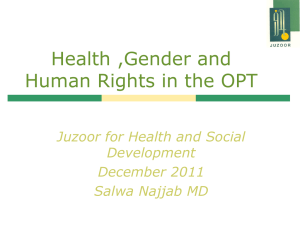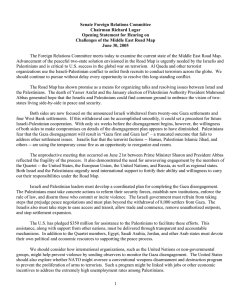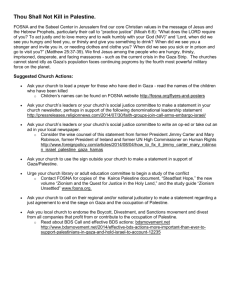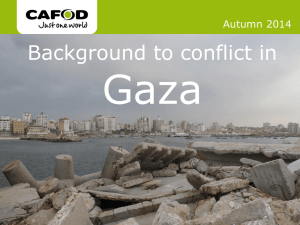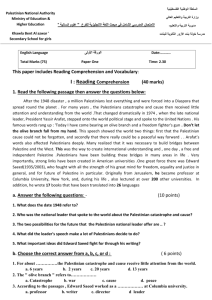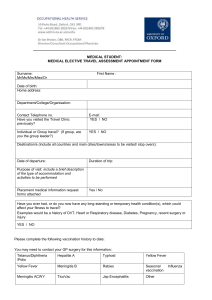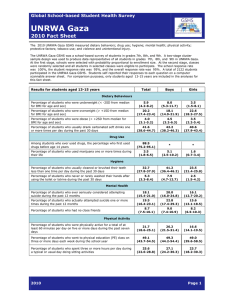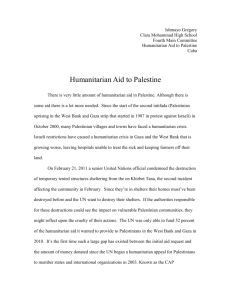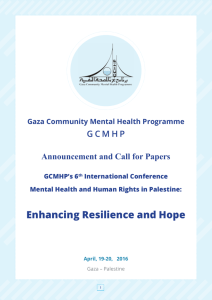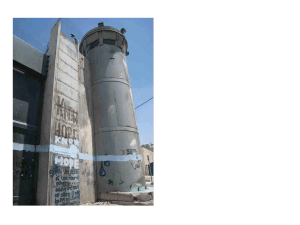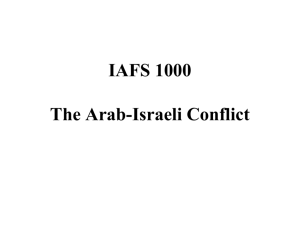Health Status in Palestine - Healing Across the Divides
advertisement
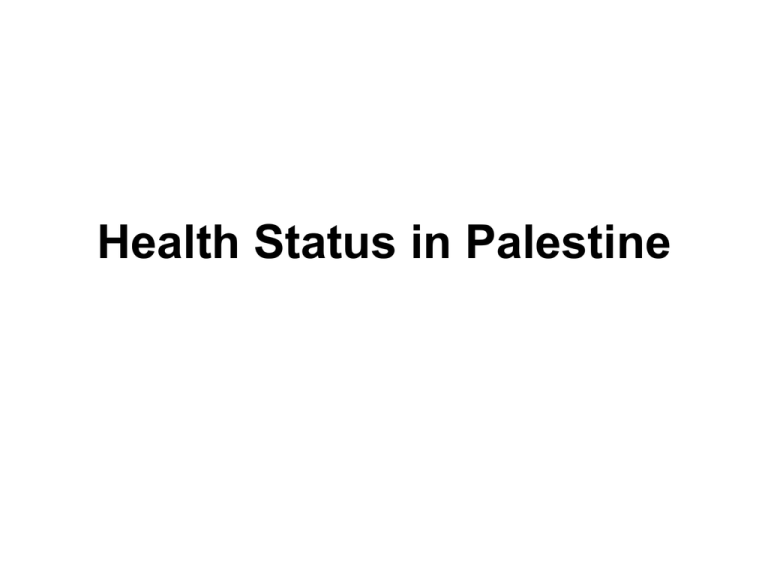
Health Status in Palestine Palestine - Demographic • From a health perspective OPt consists of two geographical areas- the West Bank (including East Jerusalem) and the Gaza strip . • The West Bank is an area of about 5,800 Km2 with a population of just over 2 million. • The Gaza is a densely populated area of 360Km2 with a population of a little over 1 million Palestine – Demographic, Cont.. • 26% of the population of the West Bank are refugees. • 65% of Gaza population are refugees. • The Palestinian population are young with nearly 20% being under 5 years old, 47% under 15, and only 5% being over 60 years old. • Average household size is just over 6 . • Population growth 3%. • 85% of Palestinians have access to water networks. • 34% of Palestinians in the West Bank and 54% in Gaza are connected to sewage networks • Per capita spend on health ( year 2000) US$ 100 ( 6.5% of per capita GDP). Selected Health Indicators 1 Indicator 2002 2000 1997 2 Population Growth Rate 3.7% 3% 3.1% 3 Crude Birth Rate 27.2/1000 33.2/1000 34.5/1000 4 Crude Death Rate 3.1/1000 birth 3.2 / 1000 birth 3.5 5 Life Expectancy Rate 71.9 71.8 71.5 6 Infant Mortality Rate 23.3 22.7 /1000 birth 24 7 Maternal Mortality Rate (per 100,000) 13.8 (reported) 37.3 ( reported) 77( Estimated) 8 Total Fertility Rate 4.31 4.31 5.58 Health Care Services There are four major health care providers operating in Palestine • Ministry of Health • UNRWA • NGOs • Private sector Health Care Services Distribution of Health Care Facilities by Provider Government UNRWA 51 NGOs TOTAL & Private 185 595 Hospitals 21 1 47 69 H. Beds 2303 58 1895 4256 PHC 359 Impact on Health since September 2000 • • • • High number of victims High number of injured High number of expected disabilities Lack of access to health services duo to checkpoints and closures. • performance of health providers and quality of services (next slide) • Budget constrains • Implementation of development of health care system affected badly Cont.. • Health insurance revenues decreased by 60% • Number of food samples and bacteriological water samples for laboratory tests decreased by 33% • Accumulation of garbage in cites and villages causing severe in both health and environment • The immune response of children for measles vaccine was affected duo to disturbance of cold chain. • Discontinuation of vaccination campaigns duo to prevention of medical teams from reaching villages and remote areas • Decrease vaccination of anti-rabies vaccine for animal bites cases by 17%, hepatitis A cases by 16% , hepatitis B for adults by 23% and anti tetanus vaccination by 35% Cont.. • Surveillance of inf. Diseases decreased • Shigelloses outbreak ( 556) was reported in Hebron • 50 cases of infectious diseases were unable to visit the central labs. For diagnosis and follow up, 200 patients of hepatitis B &C could not continue follow up • 1500 contacts to hepatitis B delayed from receiving immunization on time • Patients with chronic diseases could not receive proper follow up and medication Segregation wall General Effect of the wall • • • • • • • • • • • • Economic effect- poverty- malnutrition Stress Destruction of the health and referral systems Increased costs Prevention of patients movement Prevention of health workers movement Cutting off communities Blocking ambulances Blocking vaccines & medical, supplies Blocking preventive care Decline in care for chronic patients Serious effect on Cancer patients Impact of separation wall • The wall will affect 161,700 dunams which is 2.9% of West Bank land area. • It was estimated that the wall will cause direct harm to at least 210,000 Palestinians residing in 67 villages, towns and cities. • The wall will affect all the life aspects of the Palestinians including Health, Education, Employment, farming and social life. • 145 out of 190 Km (stage 1) start operating since July 2003. Implications on the health care system 1. Creation of 22 vulnerable enclaves (71 clinics) separated from the West Bank. 2. A change in the geographical distribution of health care facilities. 3. Isolation of rural communities from urban centers. 4. Lower quality of health care services. 5. Reliance on Humanitarian Aid. Complete enclosure 9 pockets of isolated communities. These communities are served by a total of 36 clinics. Ramallah enclaves mostly affected. Time of openings
